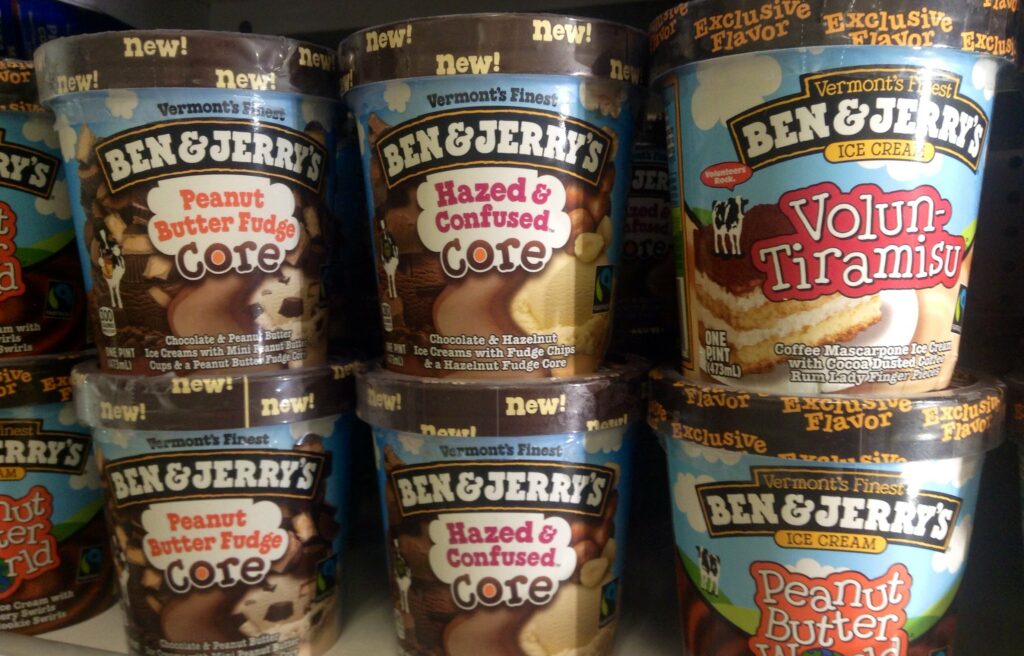Ben & Jerry’s urged the nation to “commit” to giving back the land that was “stolen” from Native Americans, turns out that they should start with their company headquarters.
The woke ice cream maker was torched on social media for posting a less than patriotic message on the 4th of July.
“This 4th of July, it’s high time we recognize that the US exists on stolen Indigenous land and commit to returning it,” the company tweeted.
The caption included a link to a blog on their website, which claimed Independence Day celebrations were held to divert attention from how European settlers took over Native American territory.
This 4th of July, it's high time we recognize that the US exists on stolen Indigenous land and commit to returning it. Learn more and take action now: https://t.co/45smaBmORH pic.twitter.com/a6qp7LXUAE
— Ben & Jerry's (@benandjerrys) July 4, 2023
“Ah, the Fourth of July. Who doesn’t love a good parade, some tasty barbecue, and a stirring fireworks display?” The post began.
The only problem with all that, though, is that it can distract from an essential truth about this nation’s birth: The US was founded on stolen Indigenous land. This year, let’s commit to returning it.
The company proposed that the government start with Mount Rushmore, which was “blasted into the side” of a “holy mountain” in the Black Hills that is sacred to the Lakota Sioux tribe.
Looks like Ben & Jerry's is becoming the Bud Light of Ice Cream.
Keep the boycott going. pic.twitter.com/O7RFaSEWK8
— I Meme Therefore I Am 🇺🇸 (@ImMeme0) July 8, 2023
The post detailed how the Fort Laramie treaties of 1851 and 1868, granted the Great Sioux Nation a 35-million-acre “permanent home” that contained the Black Hills.
The government violated the treaty when gold was discovered and forced the tribes to relocate to smaller reservations.
“From there, in 1927, they watched as their holy mountain, now located on land known as South Dakota, was desecrated and dynamited to honor their colonizers, four white men—two of whom enslaved people and all of whom were hostile to Indigenous people and values,” the article accused.
The headquarters of Ben & Jerry's is located on stolen indigenous land.
The hypocrites need to give it back. pic.twitter.com/01LBieiVcA— Mrs. S. (@hshLauraJ) July 5, 2023
In 1980, the Supreme Court sided with the Sioux and granted them a $105 million settlement that they refused to accept and is now valued at $2 billion.
“The US exists on stolen land. We have to acknowledge that—today and every day,” Ben & Jerry’s wrote. “In the case of Mount Rushmore, the Supreme Court already did!”
“This Fourth of July, it’s time to return that sacred place to the Lakota,” the brand concluded. “Let’s make it a day that embraces freedom and justice for all.”
South Dakota Gov. Kristi Noem blasted the ice cream maker for going after the monument, while speaking to “Fox & Friends” on Thursday.
“I’m not going to listen to a bunch of liberal Vermont businessmen who think they know everything about this country and haven’t studied our history,” she remarked.
Noem said that Mount Rushmore “is the greatest symbol” of freedom and history in the nation and that we can “learn from the men on that mountain.”
“I think Americans in this country need some inspiration, and we can gain it from a monument like that,” she continued.
“We should be proud of America and knock off what Ben & Jerry’s is doing. They don’t have any idea what they’re doing.”
Days after urging the nation to return “stolen” land to indigenous people, the company has its chance.
A Native American chief in Vermont said if the Half Baked creamery was “sincere” about their woke call to action, they should star with their headquarters.
Their main office is located in South Burlington, Vermont, which Chief Don Stevens said was Western Abanaki land when he spoke to the New York Post.
“If you look at the [Abenaki] traditional way of being, we are place-based people,” he remarked. “Before recognized tribes in the state, we were the ones who were in this place.”
Stevens added that he “looks forward to any kind of correspondence with the brand to see how they can better benefit Indigenous people.”

